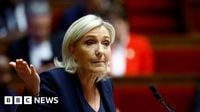Marine Le Pen, the prominent leader of France's far-right National Rally party, faced a devastating blow to her political career on March 31, 2025, when a French court found her guilty of embezzling European Parliament funds. The verdict resulted in an immediate five-year ban from holding public office, effectively sidelining her from the upcoming 2027 presidential election.
As she left the Paris courtroom, Le Pen was visibly shaken, reportedly muttering the word "Incredible" under her breath. The ruling not only barred her from running for office but also imposed a four-year prison sentence, of which two years would be suspended and the remaining two served under an electronic ankle bracelet. Additionally, she was fined €100,000 (approximately $108,000).
The court's decision came after an extensive investigation into a scheme where Le Pen and her party allegedly misappropriated €4.6 million in EU funds intended for parliamentary assistants. Instead, these funds were reportedly used to pay party workers in France, a practice that spanned from 2004 to 2016. This ruling has sent shockwaves through the French political landscape, particularly as Le Pen had been seen as a formidable contender in the next presidential election, with polls indicating she could secure as much as 37% of the vote in the first round.
Despite the serious nature of the charges, Le Pen has consistently denied any wrongdoing, framing the trial as a politically motivated attack against her and her party. "I do not feel that I have committed the slightest irregularity, the slightest illegality," she stated during the trial. Her defense argued that the roles of her assistants were not clearly defined, suggesting that their work was legitimate.
In the aftermath of the verdict, the National Rally party expressed outrage, claiming the ruling was a severe affront to democracy. Jordan Bardella, the 29-year-old president of the National Rally and Le Pen's protégé, stated, "Today it is not only Marine Le Pen who was unjustly condemned: it was French democracy that was killed." Bardella, who is now positioned as a potential candidate to replace Le Pen in the presidential race, has been seen as a rising star within the party, but questions remain regarding his experience and ability to fill Le Pen's shoes.
Le Pen's conviction has immediate implications for the National Rally, which has recently enjoyed significant popularity, becoming the largest party in the National Assembly. The party's supporters often view Le Pen as a victim of a biased political system, and the ruling may galvanize her base in the short term. However, her absence from the political scene raises concerns about the party's future trajectory.
During her leadership, Le Pen has worked to rebrand the National Rally, distancing it from its historically extreme roots. She took over the party from her father, Jean-Marie Le Pen, in 2011, and has since sought to soften its image to attract a broader voter base. This included renaming the party from the National Front to the National Rally and publicly rejecting her father's more controversial views.
As the dust settles from the verdict, the National Rally must now confront a critical decision: whether to rally behind Bardella as their new candidate or to hold out hope for Le Pen's appeal. While an appeal could potentially reverse the ineligibility ruling, the process is expected to be lengthy and uncertain, leaving the party in a precarious position.
Political analysts suggest that the ruling could also have broader implications for the French government, which has been struggling with low approval ratings and a lack of parliamentary majority. The National Rally's narrative of victimization may resonate with voters dissatisfied with the current administration, potentially strengthening the party's position in future elections.
Le Pen's conviction has drawn international attention, with some far-right leaders in Europe expressing solidarity. Hungarian Prime Minister Viktor Orbán declared, "I am Marine," indicating a shared sentiment among populist politicians who view the ruling as an attack on their movements.
In summary, Marine Le Pen's conviction marks a significant turning point in French politics, with the potential to reshape the landscape ahead of the 2027 presidential election. As the National Rally navigates this tumultuous period, the future of both the party and Le Pen's political legacy hangs in the balance.










